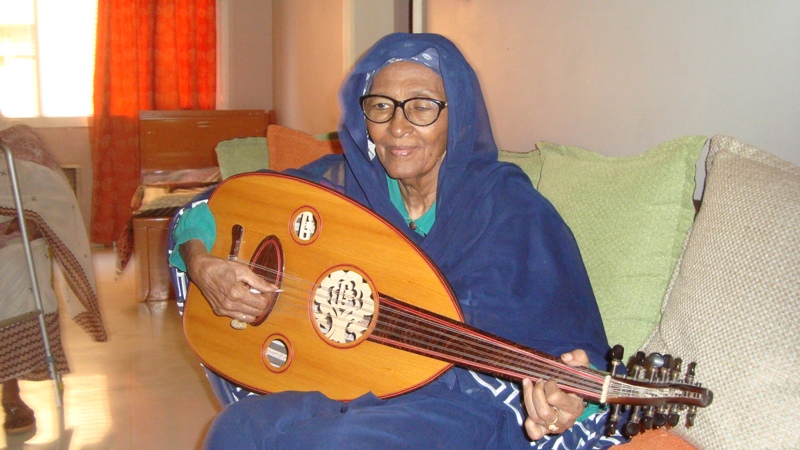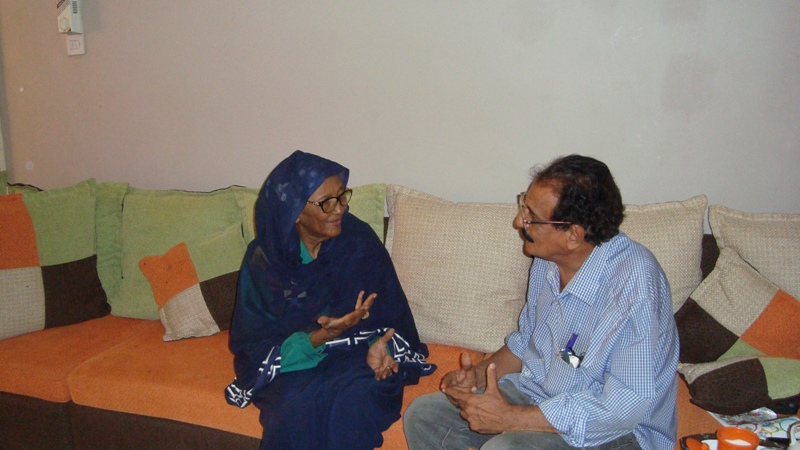The first Sudanese and Arab female composer Asma Hamza to Sudanow
09 September, 2017
- Melody like a poem is an inspiration
Asma Hamza is the first female composer in Sudan and in the Arab world. Born in 1932, she grew up in a family that resembles a fruit tree that is laden with nightingales. She used to love the lute since childhood. The instrument has become an integral part of her life for now nearly 70 years. Many a prominentsinger performed her melodies. She is seen as the best ambassador for Sudanese women in this domain. "Sudanow" met her at her home in Halfaya in Khartoum and following excerpts of translation for that interview
Question: How has it started, your relationship with music?
Asma Hamza: I grew up in a family that loves to sing, and this is how this relationship started. In the 30s of the last century, I was a young girl who used to dream, like fellow peers in theneighborhood, to become a singer, but I wasn’t endowed with the proper vocal cords for that enterprise. So I started using my lips: whistling in a way that amazed people. My father remarked it and surprised me with a lute that he borrowed from a colleague who worked with him in the army. In a few days I was able, alone and without the help of anyone, to play it in to the tune of to the songs I heard. The owner of the lute then offered it to me as a sign of admiration. That first lute is still with me, kept within my precious belongings. Since that day, the lute hasbecomea close friend and companion.
Question: You said that you started to imitate audible melodies?
Asma Hamza: We used to receive in our house many of the well-known singers of the time, including Ahmed Mustafa, Osman Hussein, Hassan Attia and Abdel Aziz Mohamed Daoud. My ears store every note I heard, so it was possible for me to play their songs. It was this way that I refined my talent and became proficient in playing the lute in a way that was appreciated. And encouragement followed.
Question: What about your first work?
Asma Hamza: I remember that one of our neighbors was celebrating the circumcision of her children. Like me, she loved singing. She came to me with words that she wrote herself and asked me to compose a melody for the occasion. I effectively did, but asked her not to mention that I wrote the music for her words. It was a ploy to avoid my family knowing it was me who composed that music. At that time, our society did not tolerate girls being associated with work of music at all.
Question: Some say you are the first female composer in the Arab world?
Asma Hamza: It is true. Women who preceded me were instrumentalists and were not known as composers, neither in Sudan and nor in other Arab countries. Musical composition was exclusively men’s domain. I was hosted by MBC TV channel in Beirut as pioneer Arab female composers. This, surely, makes me feel proud as well as all of the Sudanese women.
Question: You love Arabic music, yet you compose on the pentatonic scale?
Asma Hamza:I am from a multicultural country where many rhythms coexist, some of them have Arab roots alongside African ones, and there are intersections that combine the pentatonic scale and the heptatonic (seven-note) one. I was definitely influenced by the environment in which I grow up. Artists are in general as the product of their environment, and I admit that I love Arabic music. When I was young I tried, accompanied by my father may Allah bless his soul, to meet the Arab singer Umm Kulthum. I effectively met her twice and expressed my admiration and love for her; and amazingly, in spite of the long years I still keep a ticket to her concert.
Question: I know that you have been working with the Sudanese Armed Forces for a long time, what was the addition of this period to you as a composer?
Asma Hamza:It was the most fertile period of my life. It was during this time that many of my works were created. Perhaps the most prominent of these was the "Azza and Azza" operetta which was a turning point in my composition. I also made many other melodies for singers who subsequently made their way up the ladder of fame. I contributed to the discovery of some of these voices such as the artist Abida Sheikh.

Asma Hamza: I dealt first with the great poet Saif Eddin Al-Dassugi, the late poet Saad Eddin Ibrahim, Hassan al-Zubair, Abdul Wahab Hilawi, Tahir Ibrahim, Mohammed Ahmed Surkti, to name but a few.
Question: Are there any specific rituals associated with your music composition?
Asma Hamza: I usually read the poem more than once before starting to compose its melody, and I sing it before I play it with the lute. I used not to choose any specific singer until the composition is complete. I do not confine myself to any rituals to compose a melody. It comes in the form it wants, it is like a poem that does not necessitate a specific place, time or circumstance, it is a state of invasion that sweeps you in, tempts you and gives you freedom.
Question:Tell us about Asma Hamza Salon please?
Asma Hamza: Perhaps it was an extension of the idea of cultural and artistic salons in the Arab world in general. It was created spontaneously, many singers, poets, and musicians frequented it and it was behind the creation of a lot of names and works, even some famous singers and politicians frequented it.
Question: It is said that the great Sudanese poet Mohammed Bashir Ateeq was one of Asma Hamza’s close friends.
Asma Hamza: Ateeq, may his soul rest in peace, belongs to that generation of great poets, he was faithful to our friendship and presented many works. Perhaps his famous song "Gamal Maadi- Arabic for extraordinary beauty", which is sung by a large number of singers, was written on me as he told me.
“Your visit is our ultimate goal
And the linking point between us
Meeting you increases our suffering
And thanks to you our songs are completed”
It was me who composed the melody of the text, and it was a real success.
Question: It is said that Asma Hamza has composed the largest amount of musical pieces ever, but most of them have not been performed in public yet.
Asma Hamza: I am no longer young, but I am satisfied with my experience. I have met great singers, especially the great artist Abdul Karim al-Kabli who sang the song “Aghla min nafsi” by my music and poet Halawi’s words. Mohammed Merghani, Emad Ahmed Tayeb, Insaf Fathi, Shamus, Jili Sheikh, and Usamah Sheikh sang my melodies. By now I have more than eighty melodies but I do not know what they will become amidst this quantity of compositions and young singers rushing to easy success.
Question: It is said that you taught the lute to Bashir Abbas, the composer honored recently in Khartoum.
Asma Hamza: Indeed, he is a member of my family. When he was young I taught him all that I knew and did not know that he would become one of the greatest and most famous composers and musicians in the country and the region.
Question: Asma Hamza, you relied on your talent in your experience but you did not attend college to study music.
Asma Hamza: At that time, there were no institutes or schools for teaching music in Sudan, all of the composers then relied on talent and folklore. In my view, talent is more important than academics in this domain.
Question: Finally, what is your dream Asma Hamza?
Asma Hamza: I hope I can compose a great musical work that would be performed by many voices from all over the Arab world.









